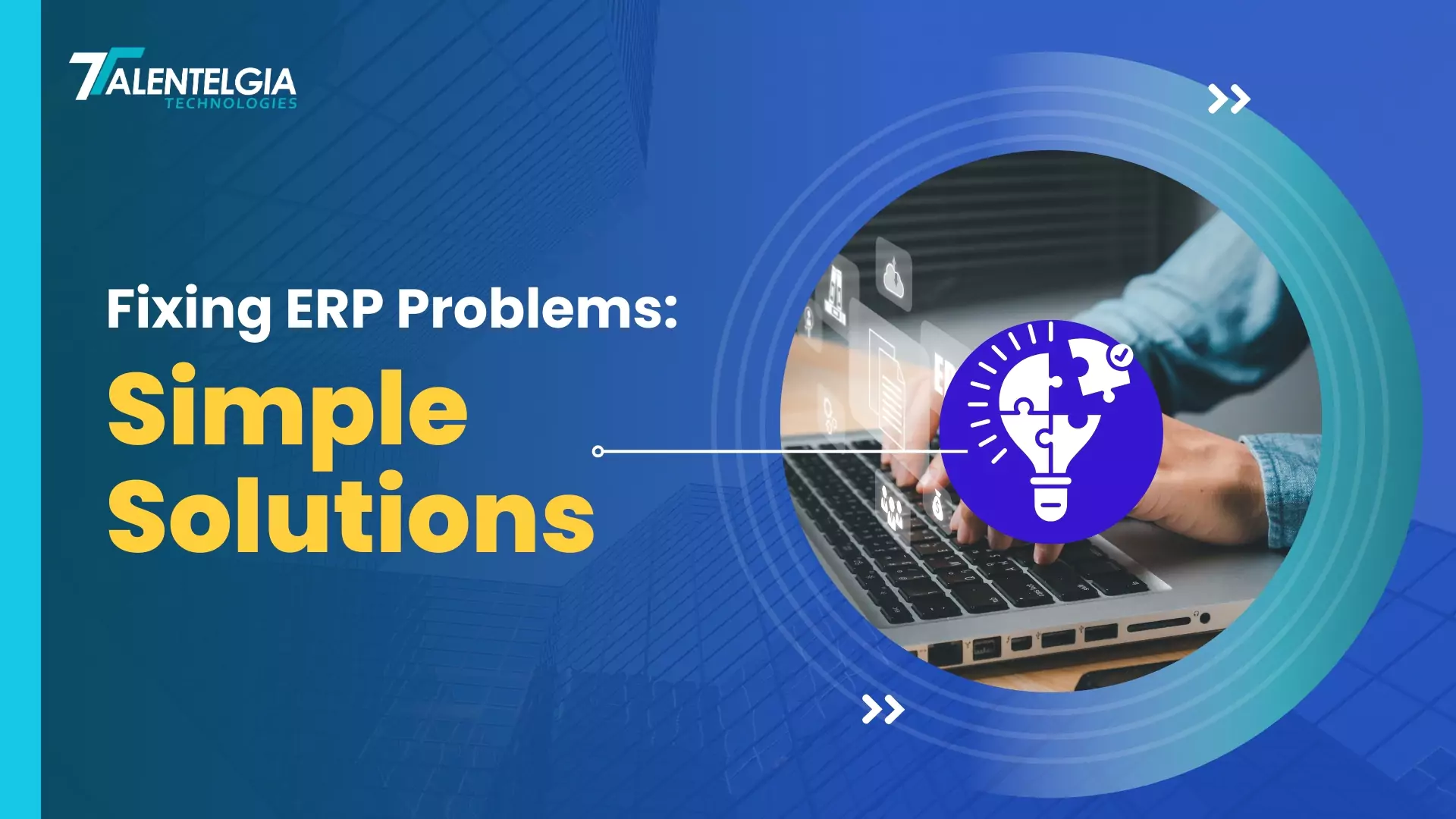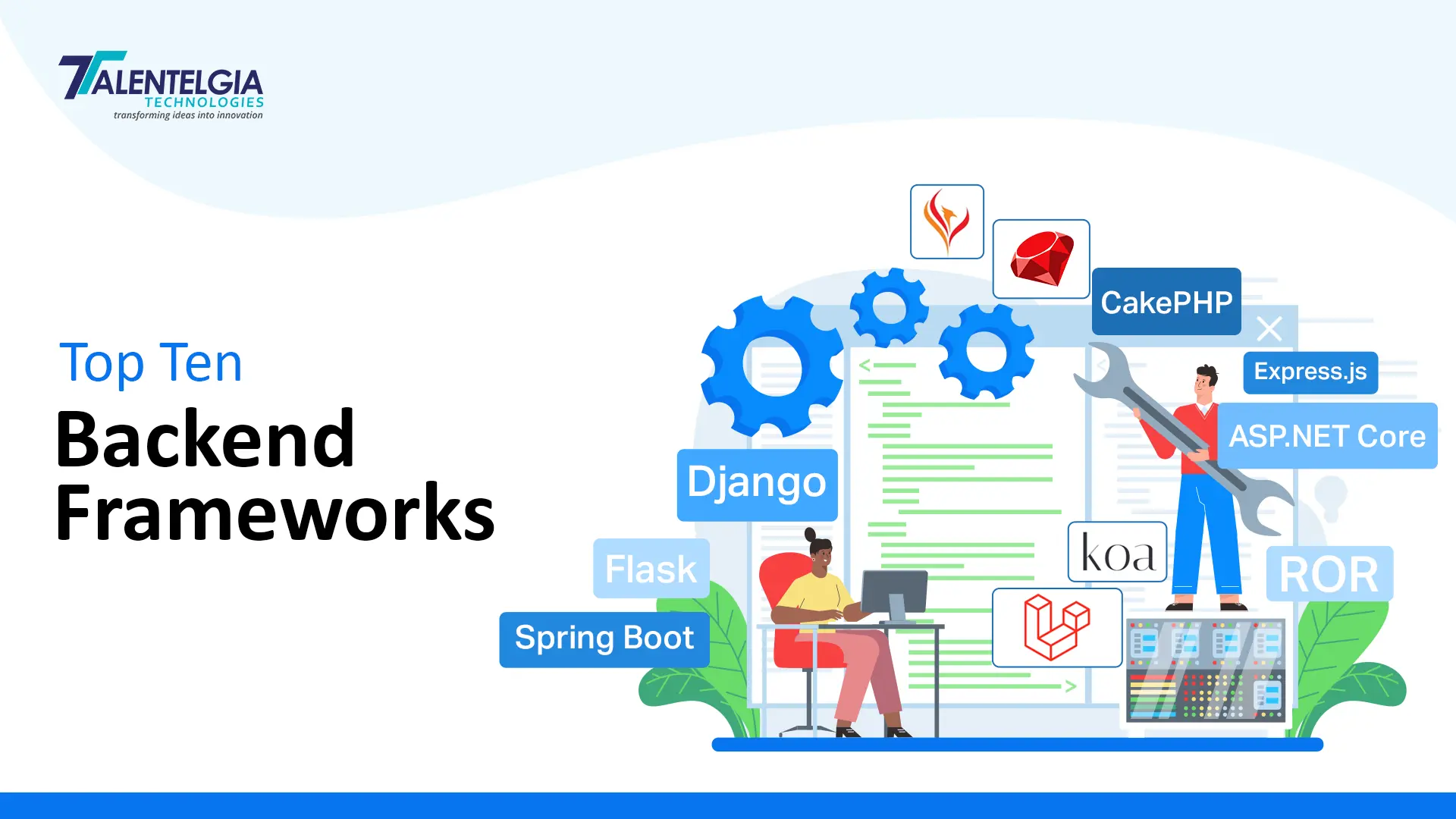Do you have any plans to enhance enterprise resource planning? ERP systems are now the backbone of businesses, supporting data-driven decision-making, boosting collaboration, and optimizing procedures.
53% of companies think ERP is one of the investment priorities.
However, the process of putting an ERP system into place is may also lead to some difficulties that frequently result in delays, cost overruns, and even project failures.
ERP implementation: What are they?
Organizations need new methods to improve their processes and acquire a competitive advantage. ERP, or enterprise resource planning.
It involves a structured process of integrating comprehensive business management software to streamline processes, enhance collaboration, and unlock valuable insights.
Challenges in ERP Development and How to Deal with Them
ERP system implementation is a complex endeavor that demands careful planning, effective change management, and strategic decision-making. By anticipating and addressing challenges like insufficient planning, change resistance, data migration complexities, customization dilemmas, and vendor collaboration issues, organizations can navigate the path to ERP implementation success.
Remember, a well-implemented ERP system has the potential to transform your business operations and position you for growth in the digital age.
Enterprise Resource Planning (ERP) implementation is the process of deploying an ERP system within an organization. It involves installing the software, configuring it to meet specific business needs, migrating data, and training users to ensure a seamless transition.
ERP implementation is not a one-size-fits-all approach; instead, it requires careful planning and customization to align with the organization’s unique requirements.
Insufficient planning and strategy
One of the primary reasons for ERP implementation failures is inadequate planning and strategy development. Organizations often rush into implementation without a clear understanding of their unique business requirements, resulting in misaligned solutions and missed opportunities.
Solution: Thorough planning is paramount. Begin by identifying key stakeholders and assembling a cross-functional team. Conduct a comprehensive analysis of your existing processes and define clear objectives for the ERP implementation. Create a detailed project plan that outlines milestones, timelines, and resource allocations. Engage with experienced ERP consultants to ensure your strategy aligns with industry best practices.
Change management resistance
ERP implementations introduce significant changes to existing workflows, which can trigger resistance among employees. Poor change management can lead to low adoption rates and hinder the system’s success.
Solution: Prioritize change management from the outset. Communicate the reasons for the ERP implementation transparently to all employees. Involve them in the decision-making process and address their concerns. Provide comprehensive training programs to familiarize employees with the new system. Highlight the benefits of the ERP system for their daily tasks and demonstrate how it will make their work more efficient.
Data Migration Complexities
Migrating data from legacy systems to the new ERP can be a complex process. Inaccurate or incomplete data migration can lead to errors and compromise the integrity of the new system.
Solution: Start by cleansing and validating data from existing systems. Develop a robust data migration plan that includes data mapping, data transformation, and data validation steps. Perform thorough testing before the go-live phase to identify and rectify any data-related issues.
Customization vs. out-of-the-box solutions
Striking the right balance between customizing the ERP system to fit your organization’s unique needs and utilizing out-of-the-box solutions can be challenging. Excessive customization can lead to high costs and longer implementation times.
Solution: Focus on your organization’s core processes that truly differentiate you from competitors and warrant customization. Opt for out-of-the-box solutions for standard processes that don’t provide a competitive advantage. Keep in mind that customization should align with the long-term scalability and upgradability of the ERP system.
Vendor Selection and Collaboration
Choosing the right ERP vendor and establishing a collaborative partnership are crucial for successful implementation. Poor vendor selection can lead to mismatched expectations and communication gaps.
Solution: Evaluate potential vendors based on their experience, industry reputation, and compatibility with your organization’s culture. Clearly define expectations, responsibilities, and deliverables in the contract. Maintain open lines of communication throughout the implementation process to address any challenges promptly.
Benefits of ERP Implementation for Businesses
- ERP implementation is a transformative journey that empowers businesses to enhance efficiency, optimize resources, and make data-driven decisions. ERP systems serve as a catalyst for growth, providing a solid foundation for businesses to thrive in the dynamic and competitive global market.
- Embracing ERP implementation is not merely an investment; it is an essential step towards staying ahead of the curve and achieving sustained success in the ever-evolving business world.
- ERP streamlines operations eliminates manual tasks, and automates processes. This boosts productivity, reduces errors, and allows employees to focus on value-added activities.
- ERP provides real-time visibility into various aspects of the organization. Decision-makers can access accurate, up-to-date data, enabling them to make informed decisions promptly.
- With a centralized data repository, ERP fosters better collaboration between departments enhancing overall communication and coordination.
- ERP helps optimize resource allocation, reducing waste and unnecessary expenses. This leads to cost savings and improved financial performance.
- As businesses expand, the ERP system’s scalability lets them accommodate increasing demands and evolving requirements.
- ERP systems often come equipped with compliance features that help organizations adhere to industry regulations, helping with risk mitigation and legal issues.
Key Steps in ERP Implementation
- Enterprise resource planning (ERP) implementation is a complex and transformative process that requires careful planning and execution. Each phase plays a crucial role in ensuring the ERP system aligns with the organization’s unique requirements and delivers maximum value.
- The first step in ERP implementation is project planning and scope definition. It involves setting clear objectives and defining the scope of the project. This includes identifying key stakeholders, creating a project timeline, and establishing measurable goals to ensure successful implementation.
- Further, to make the most of ERP, it is essential to understand existing business processes thoroughly. Business process analysis helps identify inefficiencies and areas for improvement. Business process analysis and mapping let businesses streamline operations and improve overall efficiency.
- Data migration and integration are the lifeblood of any organization, and migrating data from legacy systems to the ERP platform is a critical step. Data cleansing and validation are essential to ensuring the accuracy and integrity of information. Integrating data from various sources into a unified platform enables real-time insights and informed decision-making.
- Every organization has unique business requirements, and ERP systems need to be tailored accordingly. Customization and configuration involve modifying the ERP software to meet specific needs, while configuration refers to setting up the system to align with the organization’s processes.
- User adoption is a factor in the success of ERP implementation. Training and change management ensure they can effectively use the new system. Change management strategies are also essential to address resistance to change and facilitate a smooth transition.
Conclusion
ERP system implementation is a complex endeavor that demands careful planning, effective change management, and strategic decision-making. By anticipating and addressing challenges like insufficient planning, change resistance, data migration complexities, customization dilemmas, and vendor collaboration issues, organizations can navigate the path to ERP implementation success. Remember, a well-implemented ERP system has the potential to transform your business operations and position you for growth in the digital age.


 Healthcare App Development Services
Healthcare App Development Services
 Real Estate Web Development Services
Real Estate Web Development Services
 E-Commerce App Development Services
E-Commerce App Development Services E-Commerce Web Development Services
E-Commerce Web Development Services Blockchain E-commerce Development Company
Blockchain E-commerce Development Company
 Fintech App Development Services
Fintech App Development Services Fintech Web Development
Fintech Web Development Blockchain Fintech Development Company
Blockchain Fintech Development Company
 E-Learning App Development Services
E-Learning App Development Services
 Restaurant App Development Company
Restaurant App Development Company
 Mobile Game Development Company
Mobile Game Development Company
 Travel App Development Company
Travel App Development Company
 Automotive Web Design
Automotive Web Design
 AI Traffic Management System
AI Traffic Management System
 AI Inventory Management Software
AI Inventory Management Software
 AI Software Development
AI Software Development  AI Development Company
AI Development Company  AI App Development Services
AI App Development Services  ChatGPT integration services
ChatGPT integration services  AI Integration Services
AI Integration Services  Generative AI Development Services
Generative AI Development Services  Natural Language Processing Company
Natural Language Processing Company Machine Learning Development
Machine Learning Development  Machine learning consulting services
Machine learning consulting services  Blockchain Development
Blockchain Development  Blockchain Software Development
Blockchain Software Development  Smart Contract Development Company
Smart Contract Development Company  NFT Marketplace Development Services
NFT Marketplace Development Services  Asset Tokenization Company
Asset Tokenization Company DeFi Wallet Development Company
DeFi Wallet Development Company Mobile App Development
Mobile App Development  IOS App Development
IOS App Development  Android App Development
Android App Development  Cross-Platform App Development
Cross-Platform App Development  Augmented Reality (AR) App Development
Augmented Reality (AR) App Development  Virtual Reality (VR) App Development
Virtual Reality (VR) App Development  Web App Development
Web App Development  SaaS App Development
SaaS App Development Flutter
Flutter  React Native
React Native  Swift (IOS)
Swift (IOS)  Kotlin (Android)
Kotlin (Android)  Mean Stack Development
Mean Stack Development  AngularJS Development
AngularJS Development  MongoDB Development
MongoDB Development  Nodejs Development
Nodejs Development  Database Development
Database Development Ruby on Rails Development
Ruby on Rails Development Expressjs Development
Expressjs Development  Full Stack Development
Full Stack Development  Web Development Services
Web Development Services  Laravel Development
Laravel Development  LAMP Development
LAMP Development  Custom PHP Development
Custom PHP Development  .Net Development
.Net Development  User Experience Design Services
User Experience Design Services  User Interface Design Services
User Interface Design Services  Automated Testing
Automated Testing  Manual Testing
Manual Testing  Digital Marketing Services
Digital Marketing Services 
 Ride-Sharing And Taxi Services
Ride-Sharing And Taxi Services Food Delivery Services
Food Delivery Services Grocery Delivery Services
Grocery Delivery Services Transportation And Logistics
Transportation And Logistics Car Wash App
Car Wash App Home Services App
Home Services App ERP Development Services
ERP Development Services CMS Development Services
CMS Development Services LMS Development
LMS Development CRM Development
CRM Development DevOps Development Services
DevOps Development Services AI Business Solutions
AI Business Solutions AI Cloud Solutions
AI Cloud Solutions AI Chatbot Development
AI Chatbot Development API Development
API Development Blockchain Product Development
Blockchain Product Development Cryptocurrency Wallet Development
Cryptocurrency Wallet Development About Talentelgia
About Talentelgia  Our Team
Our Team  Our Culture
Our Culture 
 Healthcare App Development Services
Healthcare App Development Services Real Estate Web Development Services
Real Estate Web Development Services E-Commerce App Development Services
E-Commerce App Development Services E-Commerce Web Development Services
E-Commerce Web Development Services Blockchain E-commerce
Development Company
Blockchain E-commerce
Development Company Fintech App Development Services
Fintech App Development Services Finance Web Development
Finance Web Development Blockchain Fintech
Development Company
Blockchain Fintech
Development Company E-Learning App Development Services
E-Learning App Development Services Restaurant App Development Company
Restaurant App Development Company Mobile Game Development Company
Mobile Game Development Company Travel App Development Company
Travel App Development Company Automotive Web Design
Automotive Web Design AI Traffic Management System
AI Traffic Management System AI Inventory Management Software
AI Inventory Management Software AI Software Development
AI Software Development AI Development Company
AI Development Company ChatGPT integration services
ChatGPT integration services AI Integration Services
AI Integration Services Machine Learning Development
Machine Learning Development Machine learning consulting services
Machine learning consulting services Blockchain Development
Blockchain Development Blockchain Software Development
Blockchain Software Development Smart contract development company
Smart contract development company NFT marketplace development services
NFT marketplace development services IOS App Development
IOS App Development Android App Development
Android App Development Cross-Platform App Development
Cross-Platform App Development Augmented Reality (AR) App
Development
Augmented Reality (AR) App
Development Virtual Reality (VR) App Development
Virtual Reality (VR) App Development Web App Development
Web App Development Flutter
Flutter React
Native
React
Native Swift
(IOS)
Swift
(IOS) Kotlin (Android)
Kotlin (Android) MEAN Stack Development
MEAN Stack Development AngularJS Development
AngularJS Development MongoDB Development
MongoDB Development Nodejs Development
Nodejs Development Database development services
Database development services Ruby on Rails Development services
Ruby on Rails Development services Expressjs Development
Expressjs Development Full Stack Development
Full Stack Development Web Development Services
Web Development Services Laravel Development
Laravel Development LAMP
Development
LAMP
Development Custom PHP Development
Custom PHP Development User Experience Design Services
User Experience Design Services User Interface Design Services
User Interface Design Services Automated Testing
Automated Testing Manual
Testing
Manual
Testing About Talentelgia
About Talentelgia Our Team
Our Team Our Culture
Our Culture

















 Write us on:
Write us on:  Business queries:
Business queries:  HR:
HR: 




